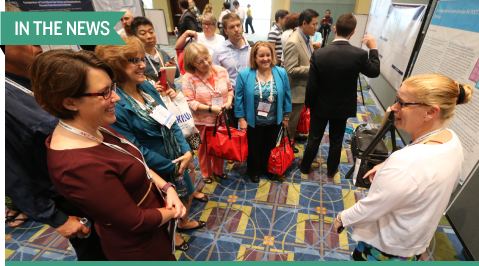
Image credit:
When asked to describe the many benefits of a poster walk at the 70th AACC Annual Scientific Meeting & Clinical Lab Expo, Christopher McCudden, who’s leading the walk for the AACC Informatics Division this year, sums it up this way: Poster tours are a chance to get together with colleagues, see some good scientific content, and take in different views about that content.
“Individual members often have their own perspectives and opinions on the subject matter, and it can be quite enlightening to hear questions and experiences from others,” McCudden, PhD, DABCC, NRCC, FADLM, associate professor with the University of Ottawa’s Department of Pathology and Lab Medicine, told CLN Stat.
Thirteen AACC divisions are hosting walks at the 70th AACC Annual Scientific Meeting & Clinical Lab Expo in Chicago. These free walks—open to full or daily conference registrants—are limited to 20 to 30 participants and last about 30 minutes.
Tours will be taking place on Tuesday, July 31, and on Wednesday, August 1, between 12:30 p.m. to 1:30 p.m.
Poster walks are often the site of new collaborations. They also provide opportunities for poster authors to share additional information, such as scripts, spreadsheets, or papers. “In this way, poster presenters become contacts who can often help troubleshoot or develop new technologies or ideas,” McCudden observed. “It’s these interactions that separate reading posters and abstracts online from the live experience at the meeting.”
The Informatics Division tour will take place Wednesday, August 1, at 12:30 p.m. McCudden said the tour will walk through 5 to 6 posters, giving the authors a chance to present to the group. “The posters have been selected based on the reviews for the abstract award for the division. Additional posters are selected based on the interests of the division executive,” he said.
John V. Mitsios, PhD, chair of the Hematology and Coagulation Division tour and assistant director for the special coagulation laboratory at BioReference Laboratories in Elmwood Park, New Jersey, also believes the tours provide an informal environment for conversation and collaboration. “The purpose of the poster tour is to foster discussion. Therefore, the executive committee and I will try to ask questions at each respective poster in an attempt to stimulate discussion,” he told CLN Stat.
Full schedule of poster sessions
Tuesday, July 31
12:30pm – 1:30 pm
Biomarkers of Acute Cardiovascular Disease
Clinical and Diagnostic Immunology
Clinical Translational Science
Endocrinology
Hematology and Coagulation
Tumor Markers and Cancer Diagnostics
Wednesday, August 1
12:30pm – 1:30 pm
Critical and Point-of-Care Testing
Informatics
Management Sciences and Patient Safety
Mass Spectrometry and Separation Sciences
Nutrition
Pediatric and Maternal-Fetal
Proteomics & Metabolomics
Another can’t miss event is the student oral presentation and poster contests on Monday, July 30. Students will compete for cash prizes by presenting their research in these formats. The oral presentation contest will take place from 1 to 2 p.m., followed by the poster contest, which will begin at 2:15 p.m. and ends at 3:30 p.m.
This year’s student poster session features four oral presentation abstracts:
- Lidong He, of the University of Virginia in Charlottesville, whose poster will describe the first top/middle-down de novo sequencing of M-protein in serum with the advantages of ultrahigh mass accuracy and extensive sequence coverage. Results serve as a blueprint for future characterization of endogenous M-protein in patients with a variety of immune system disorders.
- Christopher Koch, of Cleveland State University and Cleveland Clinic Lerner Research Institute, whose study found that aggrecan and versican accumulate in, and are potential serum biomarkers for, thoracic aortic aneurysm and dissection. These analytes are detectable in the peripheral circulation by tandem mass spectrometry and immunoassay.
- Junyan Shi, of the University of British Columbia in Vancouver, Canada, whose research team was able to develop a simple and rapid liquid chromatography-tandem mass spectrometry method for quantitation of apoA1 in human plasma by streamlining sample preparation and optimizing conditions of denaturation and digestion.
- Jeffrey SoRelle, of the University of Texas Southwestern Medical Center in Dallas, whose research found substantial differences in several lab indices for male and female transgender patients. The findings have important implications for interpreting lab tests and underscore the need for transgender specific reference intervals for laboratory testing.
Rev up for noteworthy division poster walks and lively and informative student poster events at the 70th AACC Annual Scientific Meeting & Clinical Lab Expo July 29–August 2 in Chicago.